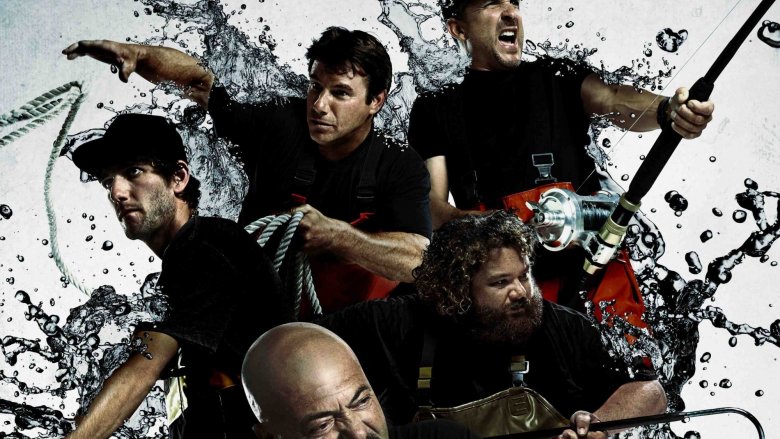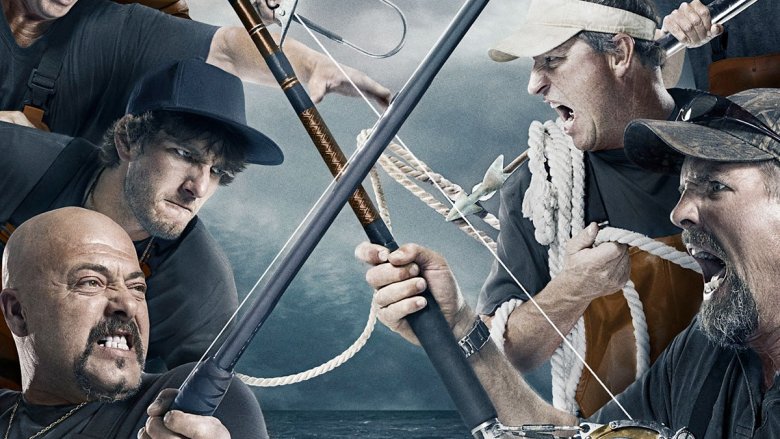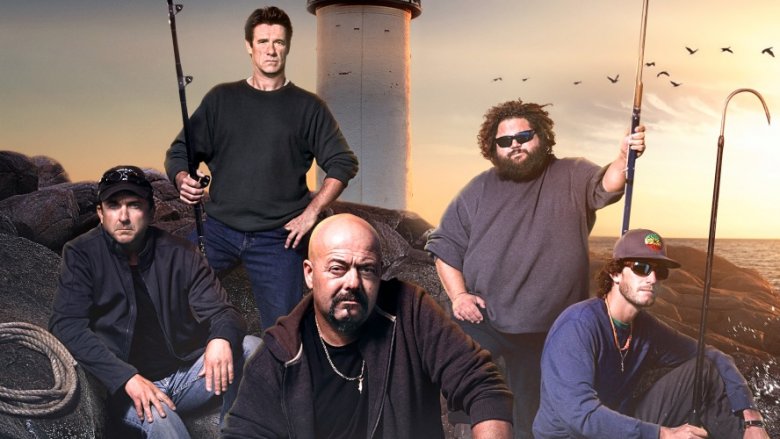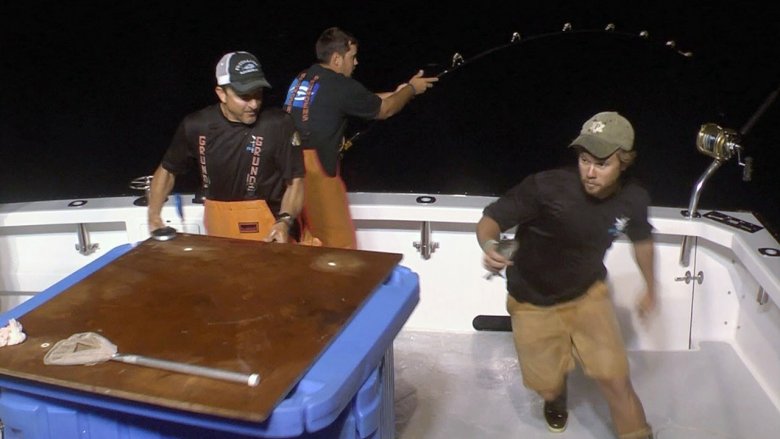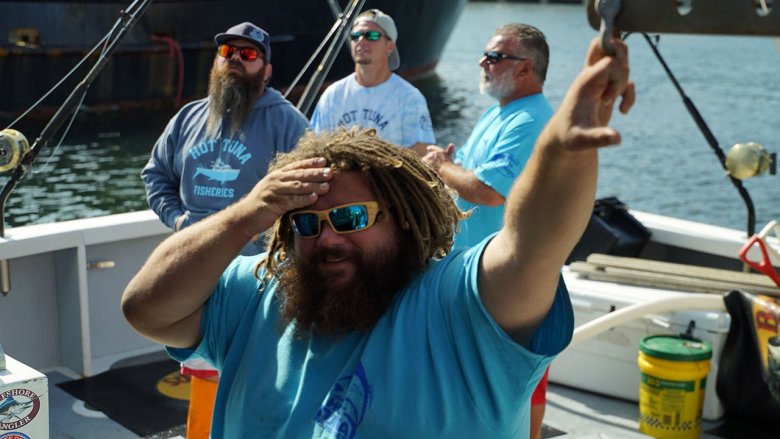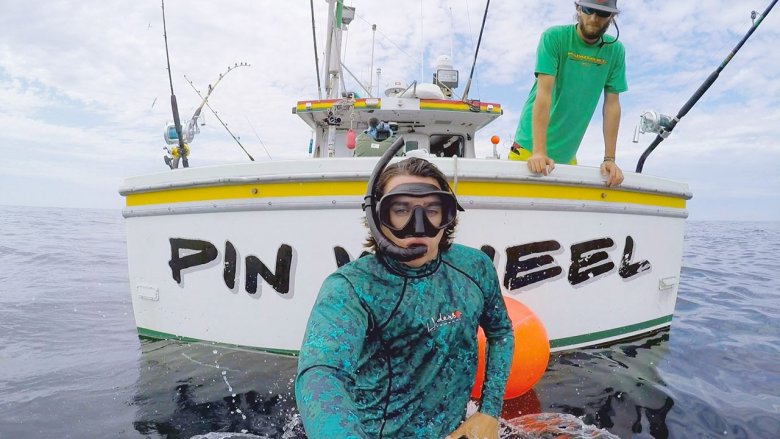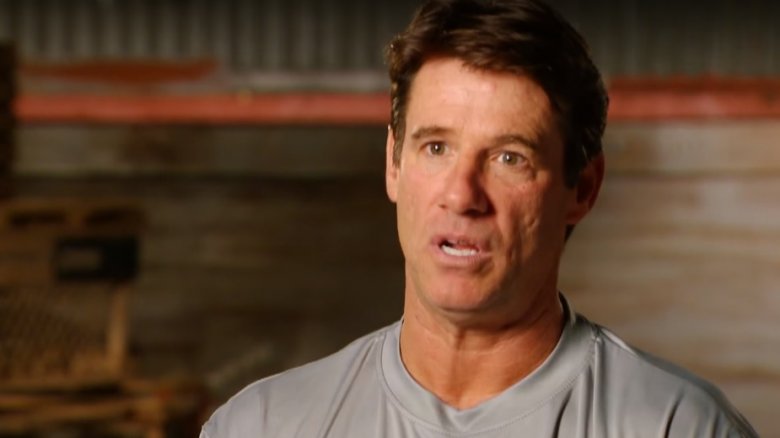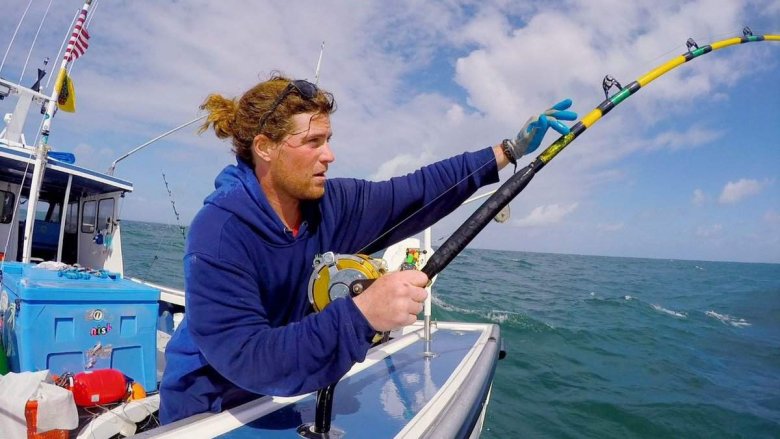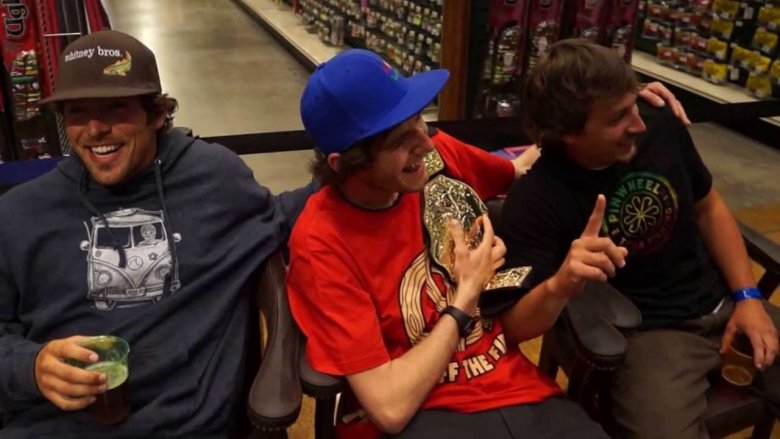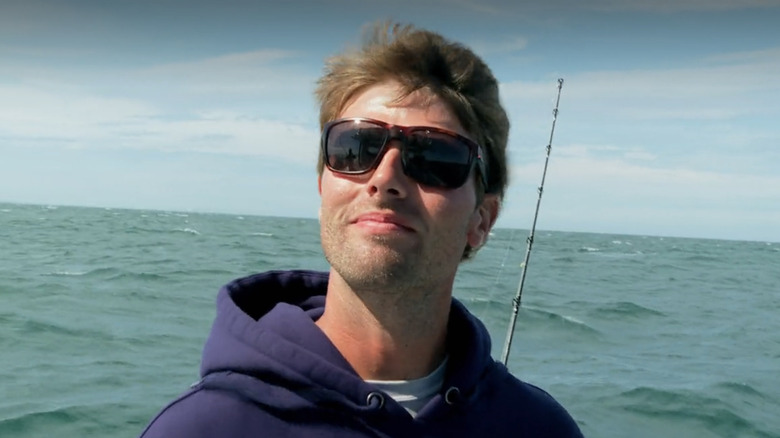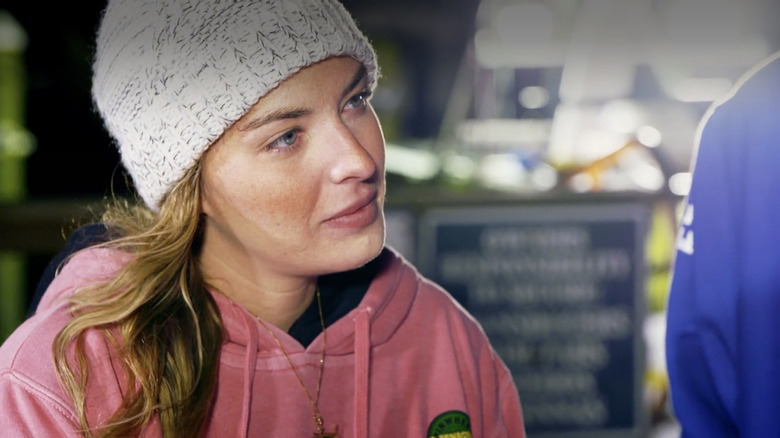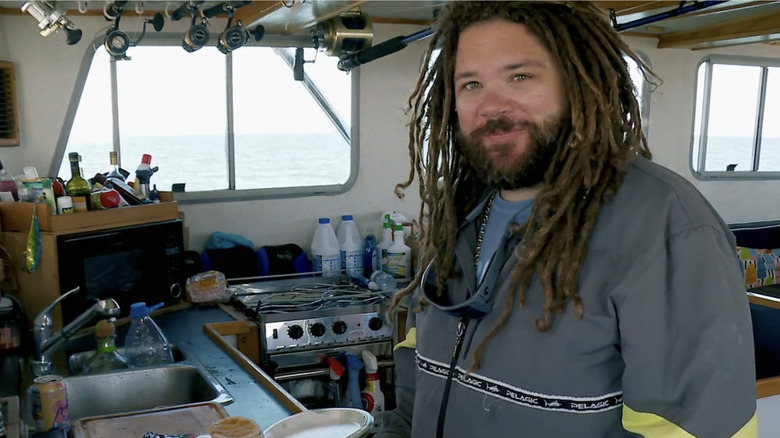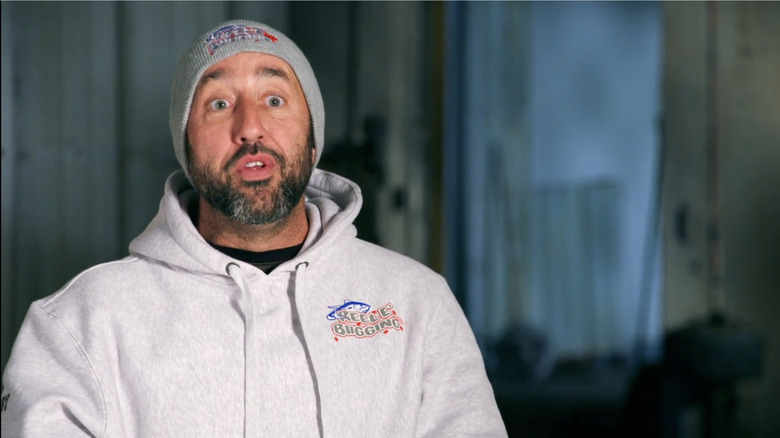The Untold Truth Of Wicked Tuna
There's something romantic about the idea of a life at sea. Waking up early to push off shore, battle the elements, and wrangle with fish? A lot of people could get down with that.
For the landlocked folks who only dream of life on the open water, there's National Geographic's "Wicked Tuna," a long-running TV show about career fishermen who spend their days on the ocean, hoovering bluefin tuna up out of the North Atlantic with rods and harpoons for profit and glory.
But as carefree as a life on the sea may seem, the hardscrabble reality is often anything but. Behind the gloss of NatGeo lights and cameras, it turns out there's some real pain and struggle that goes into making a career out of a life on the ocean. "Wicked Tuna" may be an easy show to sit back and relax with, but living the life is stressful, costly, and sometimes scandalous. Rig your harpoons and ready your hooks, and let's take a deep dive into the untold truth of "Wicked Tuna."
Fishy business
The central premise of "Wicked Tuna," naturally, focuses on the capture of the bluefin tuna fish, one of the most financially valuable creatures in the sea. This single variety of fish powers an industry that brings in $800 million in sales on a yearly basis. (In one instance, partially as a publicity stunt, a single bluefin tuna was purchased for nearly $2 million.)
Despite the huge amounts of money that flow through this market, with caught fish making their way to restaurants and being sold at a premium price to diners, not a lot of that actually ends up in the hands of the "Wicked Tuna" catchers. While they may end up grossing a fair amount on the backs of the fish they catch, they have to spend it as soon as they get it in order to maintain their businesses and keep them viable.
Speaking to Food and Wine in 2017, Captain TJ Ott of the Hot Tuna broke down some of the hard numbers one has to face in the life of a commercial fisherman. When you have to deal with boat upkeep, living expenses, and paying a crew, then what looks like a six-digit payday ends up mostly just sustaining the business, rather than making anyone involved fabulously rich.
"You've got to pinch pennies in this industry," he said. "It's a tough industry. There's nothing easy about it."
The work you don't see
Much like "Ice Road Truckers," "Pawn Stars," or almost every other reality show ever made about a commercial trade, the drama of the job gets cranked up to 11 for the sake of good TV. But while the thudding soundtrack, dramatic camerawork, and fast editing of "Wicked Tuna" makes for good entertainment, it's not a perfect reflection of what a life at sea is really like. In particular, the typical day for a commercial fisherman is not anywhere near as exciting as the show implies. While the series does a great job of conveying the most exciting aspects of catching fish, it fudges the workaday reality.
According to Captain Ott, going out fishing isn't a quick jaunt, but rather a weeklong odyssey. "What we normally do is, we'll get ice and fuel, and we'll anticipate being out three, four days," Ott has said. "Say we're running 60 miles. I'd leave around 2 o'clock in the afternoon and go about 10 knots, hoping to get to my destination right around sunset."
Despite the show's deletion of the drudgery, Ott says he's still satisfied with how the series' producers convey the reality of the job.
"I think NatGeo has it pretty well covered," Ott said. "They've done a good job showing the hardships. What people maybe don't see is the hours. You see some seasons are great, some are a struggle. It's not an easy racket."
The waiting game
If the typical "Wicked Tuna" episode can be believed, the shores of Gloucester are positively choked with valuable schools of bluefin tuna, all just waiting to get hooked up and speared through in a tidy span of 42 minutes. Unfortunately, that's not typically the case.
Just like the practice of recreational fishing that viewers are probably more familiar with, a lot of the commercial work is just sitting, waiting, and trying not to freak out about how few fish seem to be nearby. So while the "Wicked Tuna" series makes setting out to sea seem like a new adventure every day, some of the fishermen in the cast only dwell on the slow moments, when time is ticking by on what may be fruitless expeditions.
"I've been doing this a long time," said Dave Marciano, captain of the Hard Merchandise, during the series' fourth season. "So, y'know, I have mixed emotions. Yes, I'm excited, we want to get out there, we want to catch fish, and then I think about all the days I sat out there waiting for a bite. Waiting, and waiting, and waiting."
The consensus among the cast appears to be that such slow moments are just the name of the game, and that the only way to come out on top is to stick it out. "I've been dry for two months before, but in one week I've caught 20 fish," said Paul Hebert, the captain of the Kelly Ann.
Whorls of controversy
It should come as no surprise that not every viewer is particularly happy about the premise of "Wicked Tuna." Despite being sympathetic to the trials and travails of commercial fishermen, some critics have taken issue with the show's specific focus on bluefin tuna — and they've been raising that issue since before the series' start.
In 2012, a Deep Sea News article made a compelling argument against the show's focus. In short, the bluefin is among the most overexploited species in all the seven seas, with the risk of functional extinction very real. In part because the fish are so expensive, the species has arguably become endangered, as fishermen chase big paydays en masse and ignore the long-term consequences. (It's enough of an issue that NatGeo even nods to it in sponsored content and other marketing materials, making sure the world knows they're aware of the controversy.)
Interestingly, the problem with overfishing isn't the fault of the guys and gals from Gloucester. Instead, Deep Sea News argues, the issue comes from European overfishing and illegal fishing. So why pin any blame on "Wicked Tuna"? Well, the fear among critics is that the show could stoke demand for the fish in a way that helps accelerate its population decline, putting "Wicked Tuna" and NatGeo in a tricky position, PR-wise. As for the future, it's an issue that the world has yet to figure out; as of this writing, the population remains endangered.
Asleep at sea
One of the biggest struggles the fishermen of "Wicked Tuna" face isn't their competition with each other, but rather the fatigue of just being out on the water for such long periods of time, always at a baseline level of alertness.
"The captains kind of figure out when the fish are coming through, and we kind of sleep around when we need to be productive," said Tyler McLaughlin of the Pin Wheel, speaking on the panel of the "Wicked Tuna" companion show "Reel Talk." "You kind of get your mates to step up during that period of time, because you can get a bite at any point in time."
It's not that the crews are constantly at work during the days they're fishing. But their energies are significantly drained by the mere effort of being vigilant, since a fish worth thousands of dollars could bite at any moment, without warning, during the days and nights they're on the water.
"We get run down just from being awake, not even doing anything," the Kelly Ann's Captain Hebert has said. "Just being out there on the boat runs you down, burns you out. So I get whatever [sleep] I can."
Brawls on shore
While a life at sea may seem serene, some members of the "Wicked Tuna" cast have been downright pugilistic when the cameras are off. (Considering the heated inter-vessel battles that competing boats have gotten into while the cameras are rolling, this is perhaps not shocking.)
In 2015, Hard Merchandise captain David Marciano was arrested and charged with assaulting a woman, reportedly grabbing a hotel clerk by the ponytail in the early hours of the morning in Morehead City, NC. According to Marciano, who was 49 at the time of the arrest, he was only attempting to flirt with the woman, which ... okay ... maybe. But how wrong does an act like that have to go for the cops to be called?
Marciano's not the only fisherman to get hooked by the police on violent charges. In 2016, Pin Wheel captain Tyler McLaughlin was arrested and charged with misdemeanor assault after allegedly getting physical with another fisherman. According to TMZ, McLaughlin was accused of putting a man in a choke hold, breaking his nose, and giving him two black eyes while near the docks in North Carolina. We weren't there or anything, but it sounds like it might be a better tactic for a TV star to get rid of that aggression by wrestling a feisty tuna.
Pirate's gold
Captain Paul Hebert of the Wicked Pissah has also ended up on the wrong side of the law during his tenure on "Wicked Tuna." Setting him apart from his castmates, his charges weren't related to violence — but he is the only member of the cast so far who's been chased down by the federal government.
In 2015, Hebert was indicted on federal fraud charges pertaining to ill-gotten Social Security and Medicaid benefits. Specifically, Hebert was accused of bilking the government for more than $44,000 between 2010 and 2013, claiming an inability to work due to disability.
Of course, the moment Hebert decided to sign up for "Wicked Tuna" and have cameras follow him around his labor-intensive workday, he probably should have realized that the ruse's time was up. Instead, he continued to collect on the benefits, ultimately pleading guilty to the charges.
While the scam might have gotten Hebert some short-term gains, it only hurt him in the long run, leaving him sentenced to four years of probation. He also had to pay back over $53,000, losing all the money he took in and then some.
It's hard not to have sympathy for the captain here, considering what the court filings seem to show about his income. In the years before "Wicked Tuna," he reported earnings of well under $15k a year, and only received close to $39,000 in the year the show started airing. It's no wonder he cast out a net for extra cash.
Farewell to Fudge
Tragedy struck the cast of "Wicked Tuna" in July of 2018, when fisherman Nicholas "Duffy" Fudge died at the age of 28, with the news announced on the show's Facebook page. Fudge was known to audiences as a member of Captain Tyler McLaughlin's crew, working as a first mate on the Pin Wheel.
A fisherman since his early childhood growing up in New Hampshire, Fudge joined the "Wicked Tuna" series with the rest of the Pin Wheel crew in 2013. He went on to become a mainstay not just on the flagship show, but also on the series' "North vs. South"-themed spinoff, "Wicked Tuna: Outer Banks."
While no cause of death was announced for Fudge, his tragic end was reportedly sudden and unexpected, coming at the end of a stretch of risky behavior. According to reporting by Radar Online, he had been living somewhat wildly in the months leading up to his death, being arrested twice for DUI by the Portsmouth Police Department in New Hampshire — once while in possession of enough prescription drugs to get him accused of illegally dealing them. After pleading guilty to driving under the influence and resisting arrest following his second bout of charges, Fudge's driver's license was revoked. Two weeks after his court hearing, he was discovered dead on July 19 under circumstances that are publicly unknown.
Gone too soon
Unfortunately, Fudge isn't the first member of the Pin Wheel to meet an early end. On September 19, 2015, another first mate with the vessel named Adam Moser died of a reported overdose of fentanyl, an opioid that is immensely more powerful and potent than heroin. He was one of four people who died of an overdose in a single weekend in his home of Portsmouth, leading his parents to speak out about the devastating effects and human costs of the opiate epidemic.
"I went to college in the '70s. I know about parties, but it's not worth using the opiate family," said Jim Moser, Adam's father, in the days after his son's death. "You can die. You will die — it's a one-way street."
Prior to his death, Moser proved himself to be a capable fisherman and "Wicked Tuna" cast member, with his Pin Wheel crew under McLaughlin's leadership managing to come out on top in the show's second season. His tragic death at an early age was an unfortunate ending to a story that seemed, to viewers around the world, to just be getting started.
Cooperation, not Competition
The Covid-19 pandemic, in addition to the terrible loss of life it has brought across the globe, has been devastating for industries of all sorts, particularly those industries related to restaurants and food service. In the early months of the pandemic, restaurants faced not only government-mandated shutdowns, but also a customer base that was suddenly unwilling or unable to go out to eat. Restaurants shuttered all over the globe, either temporarily or permanently, plummeting demand for certain items like bluefin tuna. The value of bluefin at auction went from record highs in 2019 to disastrous lows in 2020. For the "Wicked Tuna" crews, this was an extinction-level crisis.
Rather than compete with one another for scraps, however, the show's crews and buyers decided to work together, managing their catches in an effort to keep everyone afloat, and assisting in community outreach. Leading up to the show's 10th season premiere in 2021, Dave Marciano, Paul Hebert, and the other "Tuna" captains spoke with local paper the Newburyport Daily News about the challenges of the previous year and the spirit of cooperation that bolstered them. "We didn't see the prices we saw in the past," Marciano admitted, "but it was a fun year to participate because we wanted it to be fun." Still, the realities of Covid were unavoidable; Hebert's father Donald passed away early in the pandemic, and crews didn't see the normal crowds of fans waiting for them when returning to shore.
Women on the Waves
Commercial fishing has historically been a male-dominated field, but "Wicked Tuna" has made an effort to highlight female fishermen from the beginning. Donna Monte and her husband/fishing partner Brad were featured early on in the show, and Tyler McLaughlin appointed his sister Marissa (better known by her nickname Merm) as first mate in Season 8 after the death of "Duffy" Fudge. The North Carolina-set spinoff series "Wicked Tuna: Outer Banks" featured captain Jessie Anderson and the all-female crew of the Reel Action; however, Anderson quit the show after one unsuccessful season, finding the show's structure difficult to work around. "I do better fishing on my own," she told the Virginian-Pilot.
Despite the success of the show overall, little progress has been made over the last decade to lure more female sailors and fishermen into the industry. According to career site zippia.com, commercial fishing remains roughly 90% male as of 2019. That percentage has fluctuated somewhat over the years; 2015 represents a high-water mark at just over 25% female, though that number declined quickly through the rest of the 2010s. Female fisherman earn less than 60 cents to every dollar earned by their male counterparts, and as we are still in the midst of a recession that has disproportionately affected women, that depressing statistic is unlikely to change anytime soon.
Love (and Salt) in the Air
Neither "Wicked Tuna" nor its "Outer Banks" spinoff spend much time on the fishermen's personal lives; on-camera drama is far more likely to be nautical than romantic. On a July 2020 episode of "Outer Banks," however, T.J. Ott dropped two reveals at once, introducing a brand new Rottweiler puppy that he adopted with his heretofore unknown girlfriend, PinWheel first mate Merm McLaughlin. Later in the same episode, he makes Merm an egg and English muffin sandwich (a "McMerm") and delivers it to the PinWheel to cheer Merm up after losing a couple of large catches. The reveal set "Wicked Tuna" fans abuzz, and soon TJ and Merm's relationship status was the talk of the season.
But so much talk can often lead to miscommunication, and in 2020 it was rumored and then widely reported across the internet that Ott was already married to a woman named Kristina Doellman. That rumor turned out to be true, sort of. There is a J.T. Ott who married Kristina Doellman in 2015, but he is not the star of "Wicked Tuna," just a resident of suburban Chicago with a similar name.
Fire on the Water
Engine fires are a persistent threat for commercial fishermen; even a small one can disable a boat's power and leave sailors stranded in the middle of nowhere. Large fires can destroy and entire season of work, or even be deadly. In a 2016 episode of "Wicked Tuna," a loose wire caused heat and smoke damage to J.T. Ott's boat. Camera crews were there to witness the accident and Ott's handling of it. In the end, the damage was thankfully minimal; Ott and his crew lost a day of fishing, but the boat was intact and everyone was safe.
The same, unfortunately, could not be said of the November 2020 accident that befell captain Bobby Earl and his boat Reel 'E Bugging. The boat's engine caught fire, and before long the entire vessel was in flames. Earl and his crew member Danny were luckily prepared and escaped safely on a life raft; Coast Guard rescue boats and a helicopter arrived on the scene soon after and picked them up. The Reel 'E Bugging, however, was unsalvageable. "We lost 30 years' worth of rods and reels, shoes, gear — we lost everything," he told Hollywoodsoapbox.com. The accident happened after filming on Season 7 was complete, so there were no film crew members present, and for Season 8 Earl had a new boat with the same name and was back in the Outer Banks waters, ready to risk it all again.

